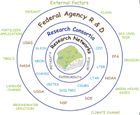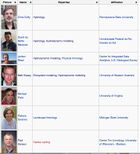Difference between revisions of "Main Page"
| Line 4: | Line 4: | ||
This study focuses on long-standing problems of coupled water and carbon budgets through development of a new scientific paradigm, <i>The Age of Water and Carbon,</i> that melds theory and practice from limnology and hydrology within the new collaborative paradigm of [[Organic_Data_Science | Organic Data Science]]. We are integrating analytical frameworks from two communities – hydrology and isotope modeling in [http://criticalzone.org Critical Zone Observatories (CZOs)] and hydrodynamic water quality modeling from the [http://www.gleon.org Global Lake Ecological Observatory Network (GLEON)] – to quantify water and material fluxes from two research sites, the Shales Hills CZO and the GLEON member site, [http://www.lternet.edu/sites/ntl North Temperate Lakes LTER]. This foundation will serve as a nexus for participation by multiple communities and will seed the growth of additional science through shared ideas, knowledge, and data. | This study focuses on long-standing problems of coupled water and carbon budgets through development of a new scientific paradigm, <i>The Age of Water and Carbon,</i> that melds theory and practice from limnology and hydrology within the new collaborative paradigm of [[Organic_Data_Science | Organic Data Science]]. We are integrating analytical frameworks from two communities – hydrology and isotope modeling in [http://criticalzone.org Critical Zone Observatories (CZOs)] and hydrodynamic water quality modeling from the [http://www.gleon.org Global Lake Ecological Observatory Network (GLEON)] – to quantify water and material fluxes from two research sites, the Shales Hills CZO and the GLEON member site, [http://www.lternet.edu/sites/ntl North Temperate Lakes LTER]. This foundation will serve as a nexus for participation by multiple communities and will seed the growth of additional science through shared ideas, knowledge, and data. | ||
| − | == | + | == The Online Framework == |
The science-driven demands of this research project have motivated the assembly of community-level resources distributed amongst institutions. The complex suite of resources, including data sets, computer models, computing resources, or technological staff must be coordinated and directed toward a common goal. | The science-driven demands of this research project have motivated the assembly of community-level resources distributed amongst institutions. The complex suite of resources, including data sets, computer models, computing resources, or technological staff must be coordinated and directed toward a common goal. | ||
The organic data science platform is a structured environment that can handle this complexity. By documenting the scientific progress, unresolved tasks that must be undertaken are made clear, both as a reminder to the principal investigators, but also to new members who want to contribute. The wiki provides a legacy of documentation, and a trail of how results were obtained. Ultimately, it is envisioned to lead to better scientific products representative of diverse contributions from both the hydrology and limnology communities. | The organic data science platform is a structured environment that can handle this complexity. By documenting the scientific progress, unresolved tasks that must be undertaken are made clear, both as a reminder to the principal investigators, but also to new members who want to contribute. The wiki provides a legacy of documentation, and a trail of how results were obtained. Ultimately, it is envisioned to lead to better scientific products representative of diverse contributions from both the hydrology and limnology communities. | ||
| − | + | == Ongoing Science Activities == | |
Our project goal is to ''predict pathways and age of water and carbon isotopes for lake-catchment systems''. To that end, we are working with the community in several major activities: | Our project goal is to ''predict pathways and age of water and carbon isotopes for lake-catchment systems''. To that end, we are working with the community in several major activities: | ||
Revision as of 14:35, 21 October 2014
Contents
Our Science Goal: The Age of Water and Carbon
This study focuses on long-standing problems of coupled water and carbon budgets through development of a new scientific paradigm, The Age of Water and Carbon, that melds theory and practice from limnology and hydrology within the new collaborative paradigm of Organic Data Science. We are integrating analytical frameworks from two communities – hydrology and isotope modeling in Critical Zone Observatories (CZOs) and hydrodynamic water quality modeling from the Global Lake Ecological Observatory Network (GLEON) – to quantify water and material fluxes from two research sites, the Shales Hills CZO and the GLEON member site, North Temperate Lakes LTER. This foundation will serve as a nexus for participation by multiple communities and will seed the growth of additional science through shared ideas, knowledge, and data.
The Online Framework
The science-driven demands of this research project have motivated the assembly of community-level resources distributed amongst institutions. The complex suite of resources, including data sets, computer models, computing resources, or technological staff must be coordinated and directed toward a common goal.
The organic data science platform is a structured environment that can handle this complexity. By documenting the scientific progress, unresolved tasks that must be undertaken are made clear, both as a reminder to the principal investigators, but also to new members who want to contribute. The wiki provides a legacy of documentation, and a trail of how results were obtained. Ultimately, it is envisioned to lead to better scientific products representative of diverse contributions from both the hydrology and limnology communities.
Ongoing Science Activities
Our project goal is to predict pathways and age of water and carbon isotopes for lake-catchment systems. To that end, we are working with the community in several major activities:
- Develop a computational model for water and carbon isotopes in lake-catchment systems
- Select core lake and catchment models
- Implement the catchment model for North Temperate Lakes
- Implement the lake model for North Temperate Lakes
- Couple the lake and catchment models
Contributing to this project
There is a growing set of contributors to the project.
We are approaching this work with a new framework for collaboration that we call Organic Data Science. See this site for more information about this framework.
The contents of this wiki are accessible to everyone. If you would like to contribute new content, please contact us to obtain an account by emailing us at organic.data.science@gmail.com.
Acknowledgments
This work is supported by the National Science Foundation through the INSPIRE program with grant number IIS-1344272.

